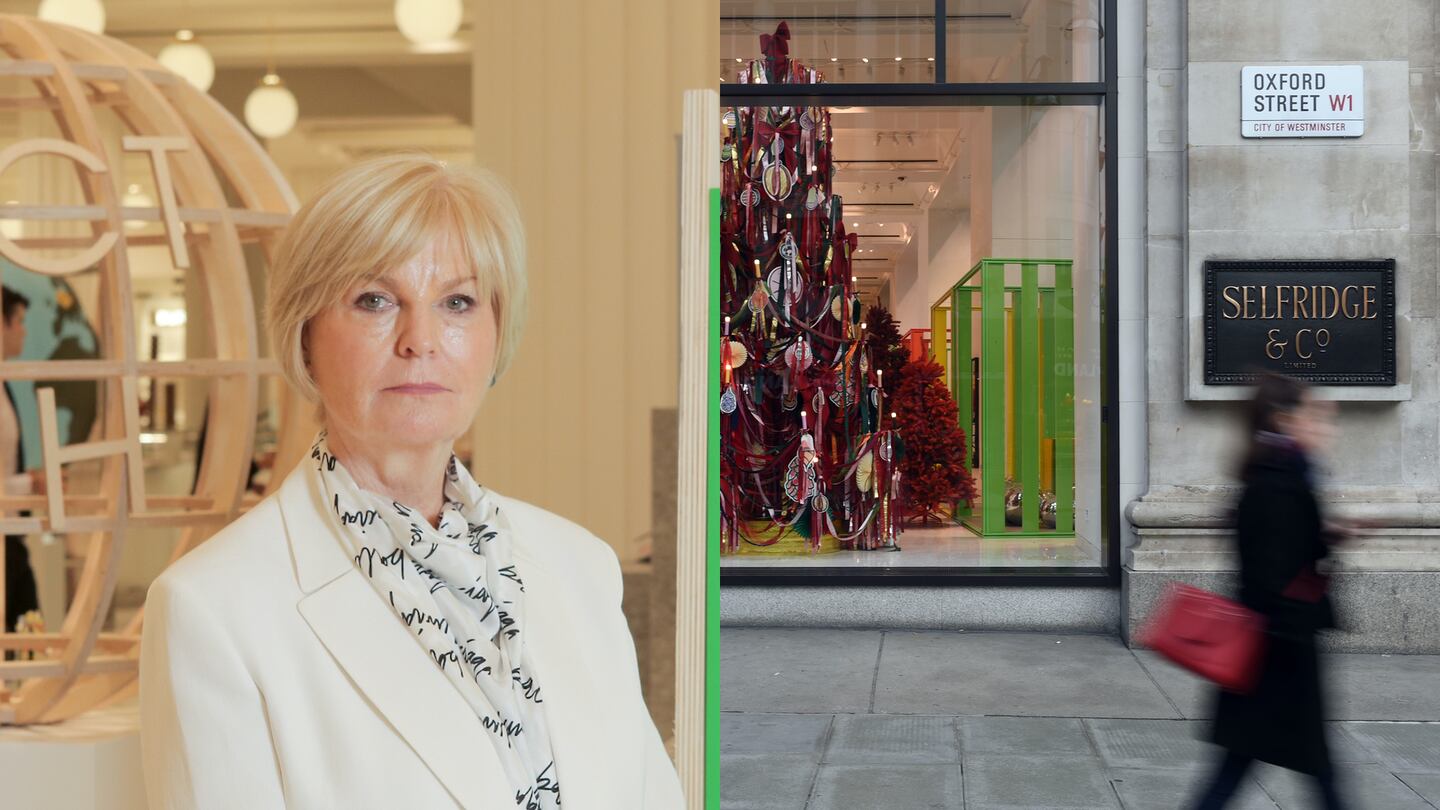
The Business of Fashion
Agenda-setting intelligence, analysis and advice for the global fashion community.

Agenda-setting intelligence, analysis and advice for the global fashion community.

This article appeared first in The State of Fashion 2021, an in-depth report on the global fashion industry, co-published by BoF and McKinsey & Company. To learn more and download a copy of the report, click here.
Selfridges had ambitious plans for 2020. The luxury department store chain had emerged from a decade of retail disruption in a better position than many competitors and was preparing to launch a grand new strategy focused heavily on sustainability to drive future engagement and growth. The pandemic hasn’t changed that conviction, but it has delayed the retailer’s plans and put it in a more precarious position.
With five department store businesses under its umbrella — Selfridges in the UK, Arnotts and Brown Thomas in Ireland, De Bijenkorf in the Netherlands and Holt Renfrew in Canada — the Selfridges Group is in the eye of the global retail storm. Not only are its stores located in historic- ally busy, city-centre locations where high-spending tourists are now largely absent, luxury sales remain in a slump across most of its markets. Amid the gloom, Managing Director Anne Pitcher says she also sees exciting opportunities.
BoF: Some industry commentators say that this is an opportunity to reinvent retail. How do you see the industry evolving in the coming years?
ADVERTISEMENT
Anne Pitcher: Retail is part of an ecosystem, isn’t it? Retail depends in part on office workers being back in the office, and there’s also a materiality attached to international travel. Most importantly, how the customer wants to shop and what is important to us as individuals is changing the entire business model. What was bad in retail before is probably not going to survive. What was super challenged before is definitely not going to survive. What was good before probably will, but we will have to reimagine the way we do retail, reimagine the way we sell, reimagine our business models completely, if we’re going to respond to all of these changing behaviours.
BoF: This year, Selfridges has set targets for brands stocked in its stores to meet minimum sustainability standards by 2025. That’s a big ask. At the same time, you’ve also had to make some difficult decisions over the last few months about order volumes and product mix. How do you manage that kind of relationship in a sustainable manner and with respect?
AP: Let’s not hide from the truth. It’s really hard. I always try and advocate that a great business relationship is one where both do well, where both succeed, [by] trying to find a way where both generate profitability. It doesn’t always work. Some of our most important partners are in terrible difficulty. That leaves a big hole in our mix, but there’s lots of opportunity out there as well. I hope many people would say of our businesses that we pay our bills, and that’s a good start. I would like most to say we’re fair. Fair but tough is a good place to be.
BoF: There’s so much talk about “rewiring” the fashion industry. How is that affecting business from a buyer’s perspective?
AP: Buyers and wholesalers are having a really tough time right now. This is where a level of trust is emerging as critical to the relationship and will make us stronger in the longer term. The reality is, no retailer has received enough stock quickly enough, which is forcing much longer sale periods before stock is replenished. We’ve probably all made more profit out of having a longer sale, but only because new [product] hasn’t been delivered as soon as it was [previously]. That’s good, except we haven’t taken in as much money because we haven’t had the new deliveries. I think a new business model is emerging. It’ll take a couple of years at least to bed in, and somebody will always want to get there first. We will have later spring deliveries, which is going to make the whole Black Friday week and Christmas, hopefully, look very different. We don’t have Black Friday in our group, but we’ve all been trying to reduce the scale of activity that peaks around Black Friday week. It’s unsustainable, absolutely unsustainable.
BoF: Are people going to buy as many clothes as they used to through the rest of the pandemic and afterwards or do you think apparel should have a smaller part in the merchandise and service mix in stores? In other words, was the opening of Selfridges’ bike shop in London during the pandemic a sign of things to come?
AP: We cannot continue to consume at the rate we have, so there is a huge question that we need to answer. We will probably end up selling less, won’t we? At the moment, we are still selling very beautiful things, so I think it’s a question of choice, not always, “Can I afford it?” The throwaway [purchase] is definitely, for us, slowing down but [buying something] that will last for years, I think that is definitely going to emerge. If we are going to sell less, what are we going to put in these great big spaces that are shops? We’ve got loads of things we can do, and the experience sits at the centre of that thinking.
We cannot continue to consume at the rate we have, so there is a huge question that we need to answer. We will probably end up selling less, won’t we?
BoF: What kind of experiences, particularly in a socially distanced world?
ADVERTISEMENT
AP: Department stores are lucky, because they are by necessity big, open spaces. There’s still so much art, food, culture, conversation, relevance. We’ve used our cinema non-stop to create conversations. The skate park is still fully booked. There’s a lot more that people can do in a space than just buy stuff. Being together, even if socially distanced, is one of the main ones. For anyone to go out, there needs to be a purpose and that’s how we need to think about the way we do business.
BoF: What about international travel and tourism? In the past, Selfridges has invested heavily in wooing international customers, with translations, multilingual staff, tax-free shopping services and so on — not only for the London flagship but for its branches in Birmingham and Manchester. How do you manage the decline and what do you need to do to entice local customers more?
AP: It’s [an] opportunity to focus on your local customer and your domestic marketplace again. That’s why I would point to the recovery being stronger outside capital cities. All of our businesses are very local, but there is a huge opportunity to continue to build domestic business. You can start with a pretty strong assumption that digital is going to continue to over-deliver on 2020 plans, so [there will be] more investment in digital, more investment in acquiring, attracting and growing a relationship with domestic customers. One of the things we have done well in the past is invite people into the store for events. We’ve found that we’ve reached a much wider audience with some of our recent digital conversations, turning them into customers of the future.
BoF: At least for the foreseeable future, online is so much more important. There are already quite a few established online luxury marketplaces, how does Selfridges distinguish itself in that space and become a destination digitally in the same way that it is physically?
AP: Somebody said to me, “How do you turn a department store into a customer store?” [Customers] don’t care how they shop, really. They definitely care about who they shop with, and why they would shop with that business, brand or person. I think that’s what we do. We put our thinking in the hearts and minds of our customers and try to bring a conversation to life with them that touches how they feel. I’ve always believed that being able to bring a brand to life for a customer, however they want it, whether they want to go in the shop, have a social day out with a friend, or whether they want to sit at home and buy online, I think it’s the same, in a way. Our strength is we have both, and I believe wholeheartedly that the more we can knit the two together, the stronger we will be.
BoF: But what if international travel can’t really pick back up, and the UK is in a deep recession?
AP: Well, there’s going to be fewer people. There’s going to be fewer retailers, let’s be clear. There’s probably going to be less money spent. It’s going to be hard and it’s going to be long. I would say that you want to recover to where you were in two or maybe three years. If you don’t get back to where you were in 2019 within that period of time, it’s going to be a pretty long journey ahead. We’ve done better than we thought [this year] but we haven’t done well enough. I guess I am more confident about the roadmap ahead on the basis of what I’ve seen, but I’m equally concerned that an earlier Covid 2.0 could really disrupt us even further. I think the point is, whilst we’re clear on what’s happened, we cannot have any clarity over what, let’s say, the next 12 months is going to look like. If international travel doesn’t happen before 2022, it’s going to be very long and very hard [for all of us]. We will need to focus far more on our communities and our relevance in our domestic market, and we’ll all need to try new models.
This interview has been edited and condensed.
The State of Fashion 2021 Report: Finding Promise in Perilous Times
The fifth annual State of Fashion report forecasts the continuation of tough trading conditions for the global fashion industry in 2021. Changing consumer behaviour and shifting markets will force companies to find their 'silver lining strategies' to unearth digital innovation and reimagine physical retail. Explore the 10 themes that will define the state of the fashion industry in 2021 and how to navigate uncertainty while unlocking new opportunities in the sector’s recovery.
Explore the full report here.
1.
Learning to Live with the Virus
2.
Diminished Demand Is Here to Stay
3.
The Digital Sprint Will Have Winners and Losers
4.
Consumers to Seek Justice in the Supply Chain
5.
Travel Disruption Will Redraw the Fashion Map
6.
Less Is More for Both Consumers and Brands
7.
Fashion Is Set for a Surge in M&A
8.
Keep Your Suppliers Close
9.
Rethinking Retail ROI
10.
The WFH Revolution Will Rewire the Workplace

Sarah Kent is Chief Sustainability Correspondent at The Business of Fashion. She is based in London and drives BoF's coverage of critical environmental and labour issues.

Hannah Crump is Associate Director of Strategy at The Business of Fashion. She is based in London and manages long-form content, including Case Studies and Reports.
As a push to maximise sales of its popular Samba model starts to weigh on its desirability, the German sportswear giant is betting on other retro sneaker styles to tap surging demand for the 1980s ‘Terrace’ look. But fashion cycles come and go, cautions Andrea Felsted.
The rental platform saw its stock soar last week after predicting it would hit a key profitability metric this year. A new marketing push and more robust inventory are the key to unlocking elusive growth, CEO Jenn Hyman tells BoF.
Nordstrom, Tod’s and L’Occitane are all pushing for privatisation. Ultimately, their fate will not be determined by whether they are under the scrutiny of public investors.
The company is in talks with potential investors after filing for insolvency in Europe and closing its US stores. Insiders say efforts to restore the brand to its 1980s heyday clashed with its owners’ desire to quickly juice sales in order to attract a buyer.